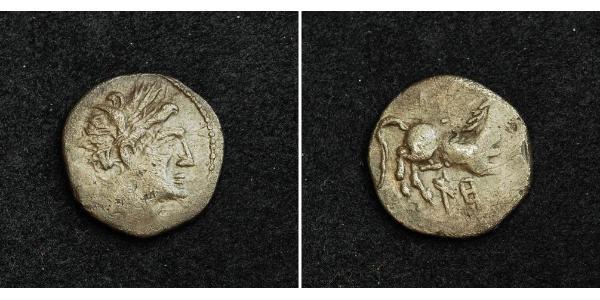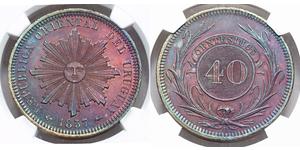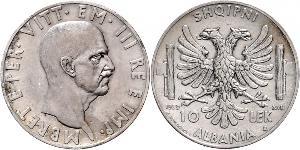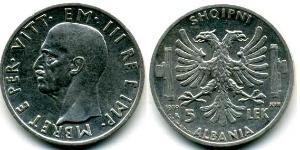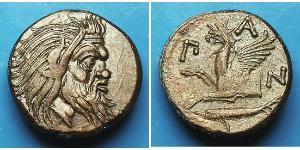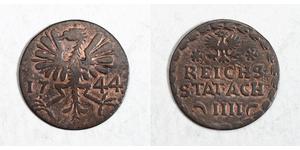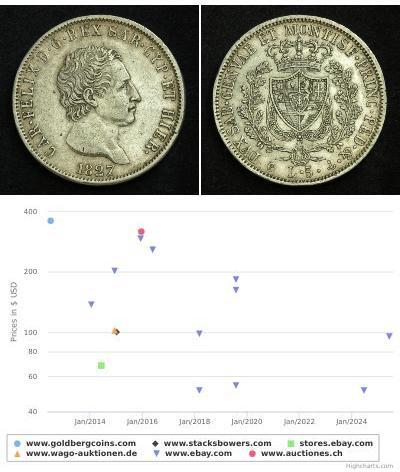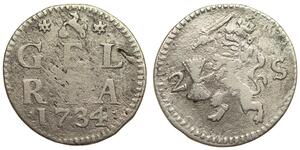(продана за $103.0)
Sicily, Siculo-Punic Issue (231-210 BC) AR Quarter Shekel Coin. Triptolemus. R!
Condition: VF
Mint Place: Agrigentum
Mint Year: 213-210 BC
Denomination: AR Quarter Shekel
Reference: Müller III, 38, 47. Rare!
Diameter: 13mm
Material: Silver
Weight: 1.12gm
Obverse: Head right of Triptolemus wreathed with wheat ears.
Reverse: Horse galloping right, Punic letters below.
Agrigento, is a city on the southern coast of Sicily, Italy, and capital of the province of Agrigento. It is renowned as the site of the ancient Greek city of Akragas (also known as Acragas (Ἀκράγας) in Greek, Agrigentum in Latin and Kirkent or Jirjent in Arabic), one of the leading cities of Magna Graecia during the golden age of Ancient Greece.
The First Punic War (264 to 241 BC) was the first of three wars fought between Ancient Carthage and the Roman Republic. For nearly 20 years, the two powers struggled for supremacy in the western Mediterranean Sea, primarily on the Mediterranean island of Sicily and its surrounding waters but also to a lesser extent North Africa. Carthage, located in what is today Tunisia, was the dominant Western Mediterranean power at the beginning of the conflicts.
The series of wars between Rome and Carthage were known to the Romans as the "Punic Wars" because of the Latin name for the Carthaginians: Punici, derived from Phoenici. The Punici (from Latin pūnicus, pl. pūnici) were a group of western Semitic-speaking peoples from Carthage in North Africa who traced their origins to a group of Phoenician settlers, but also to North African Berbers Punic language ancestry.
Triptolemus (Greek: Τριπτόλεμος, lit. "threefold warrior"; also known as Buzyges), in Greek mythology always connected with Demeter of the Eleusinian Mysteries, might be accounted the son of King Celeus of Eleusis in Attica, or, according to the Pseudo-Apollodorus (Bibliotheca I.V.2), the son of Gaia and Oceanus—another way of saying he was "primordial man".
While Demeter (in the guise of an old woman named Doso) was searching for her daughter Persephone, who had been abducted by Hades, she received a hospitable welcome from Celeus. He asked her to nurse Demophon—"killer of men", a counterpart to Triptolemus— and Triptolemus, his sons by Metanira. Demeter saw Triptolemus was sick and fed him her breast milk. Not only did he recover his strength but he instantly became an adult. As another gift to Celeus, in gratitude for his hospitality, Demeter secretly planned to make Demophon immortal by burning away his mortal spirit in the family hearth every night. She was unable to complete the ritual because Metanira walked in on her one night. Instead, Demeter chose to teach Triptolemus the art of agriculture and, from him, the rest of Greece learned to plant and reap crops. He flew across the land on a winged chariot while Demeter and Persephone, once restored to her mother, cared for him, and helped him complete his mission of educating the whole of Greece in the art of agriculture.
When Triptolemus taught Lyncus, King of the Scythians, the arts of agriculture, Lyncus refused to teach it to his people and then tried to kill Triptolemus. Demeter turned King Lynchus into a lynx. Triptolemus was equally associated with the bestowal of hope for the afterlife associated with the expansion of the Eleusinian Mysteries (Kerenyi 1967 p 123).
In the archaic Homeric Hymn to Demeter, Triptolemus is briefly mentioned as one of the original priests of Demeter, one of the first men to learn the secret rites and mysteries of Eleusinian Mysteries: Diocles, Eumolpos, Celeus and Polyxeinus were the others mentioned of the first priests. The role of Triptolemus in the Eleusinian mysteries was exactly defined: "he had a cult of his own, apart from the Mysteries. One entered his temple on the way to the closed-off sacred precinct, before coming to the former Hekataion, the temple of Artemis outside the great Propylaia." (Kerenyi). In the 5th-century bas-relief in the National Museum, Athens (illustration), which probably came from his temple, the boy Triptolemus stands between the Two Goddesses, Demeter and the Kore, and receives from Demeter the ear of grain (of gold, now lost).
Porphyry (On Abstinence IV.22) ascribes to Triptolemus three commandments for a simple, pious life: "Honor your parents", "Honor the gods with fruits"—for the Greeks, "fruits" would include the grain—and "Spare the animals" (Kerenyi, p128).
Triptolemus is also depicted as a young man with a branch or diadem placed in his hair, usually sitting on his winged chariot, adorned with serpents. His attributes include a plate of grain, a pair of wheat or barley ears and a scepter.
Celeus or the peasant Dysaules may be substituted for Triptolemus as the primordial Eleusinian recipient of the first gifts of the Mysteries.

|
Добавив:
anonymous 2014-05-05 |

